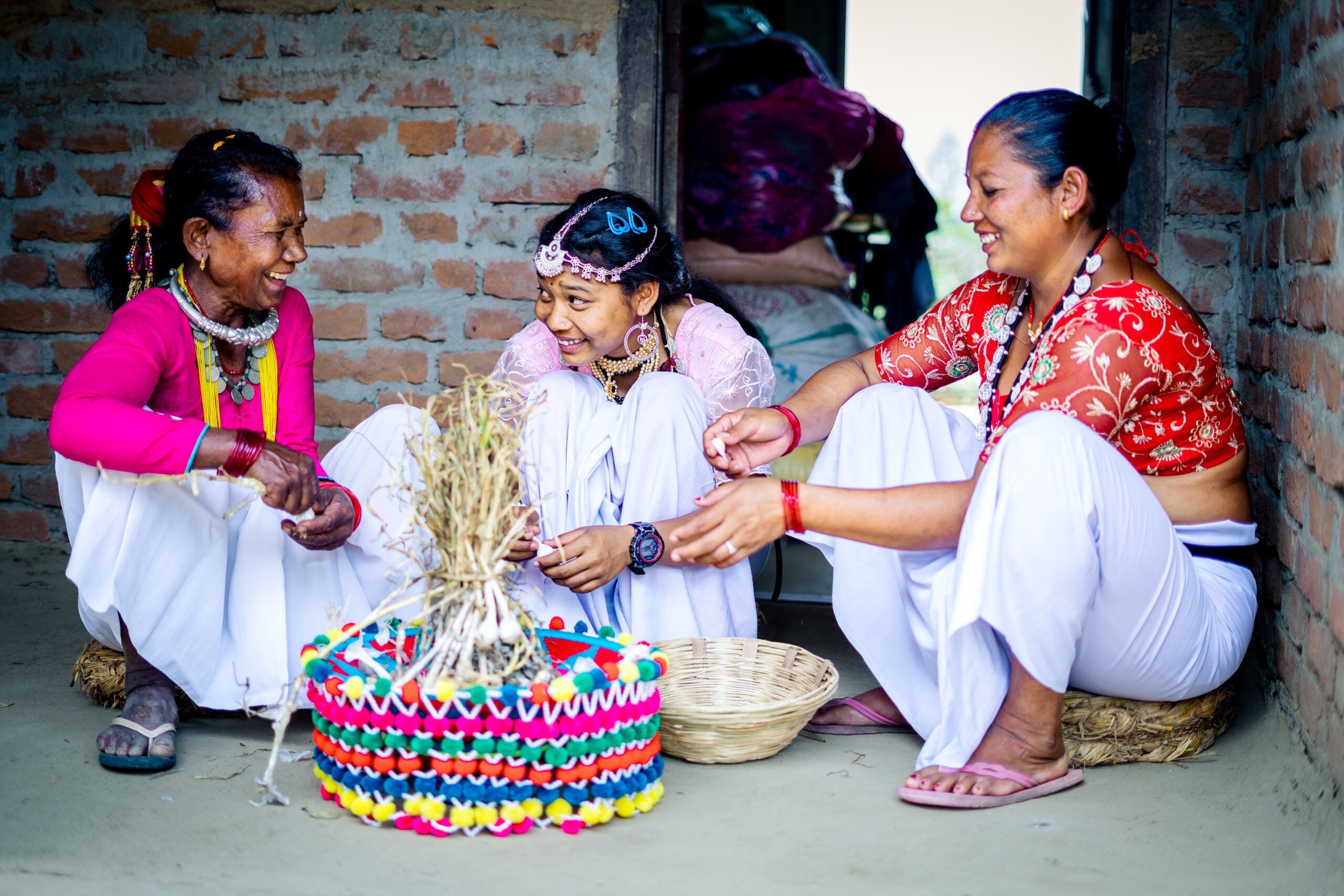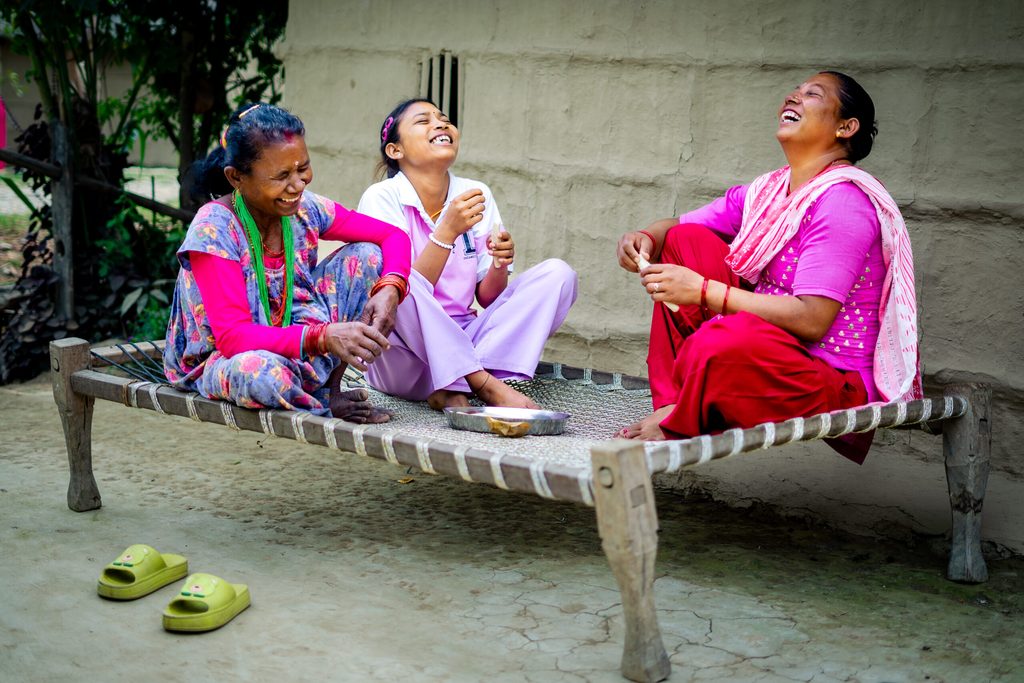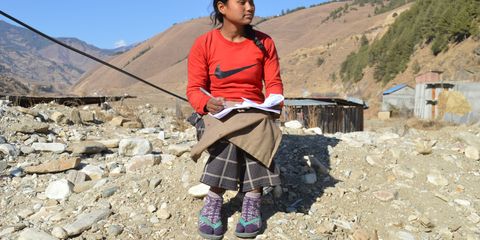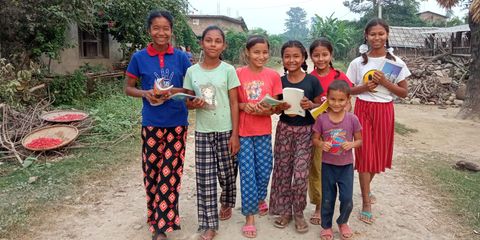Across generations- periods through the ages
Older generations of women had very different experiences of managing their periods to teenagers today – but modern girls are still calling for better, cheaper access to sanitary products, and continue to face widespread stigma and prejudice surrounding periods.
Three generations of women from Nepal – grandmother, Tilki, 67, her daughter, Rita, 35, and granddaughter Pushpa, 16, -share their different experiences of managing their periods through the years.

In Bardiya, located in western Nepal, 16-year-old Pushpa (pictured center) enjoys conversing with her mother and grandmother about their family’s history.
First period experience
“Nowadays, things have changed. I can openly acknowledge when I’m on my period and address any issues I may encounter using the toilet when I am menstruating,” says Pushpa.
“When I had my first period, I was scared at my uncle’s house. Initially silent and anxious, eventually opening up to my sister who told my aunt. Now, I’m knowledgeable about menstruation, as are my mother and sisters,” Pushpa continues.
“When I had my first period, I was scared at my uncle’s house. Initially silent and anxious, eventually opening up to my sister who told my aunt. Now, I’m knowledgeable about menstruation, as are my mother and sisters.”
Pushpa, 16, Bardiya
She further adds, “My school friends say they follow menstrual restrictions, such as not cooking or sleeping indoors during their periods. I find these practices uncomfortable and disagree with them. Back then, there were no pads available at school. If we stained our clothes or had menstrual cramps, we had to quickly go home since there wasn’t even a health post nearby.”
Pusha’s mother Rita shares, “During my first period, my mother didn’t provide much guidance. I wasn’t as comfortable then as I am now, and I felt apprehensive about telling my parents.”
She adds, “Previously, we made makeshift pads from clothes during our period. Nowadays, girls use sanitary pads and receive proper attention to their diet during this time. In the past, we struggled with inadequate diets while managing chores, but now we ensure our daughters have reduced workload during their periods.”
“In the beginning, it was very challenging. Concealing menstruation was nearly impossible, and we relied on makeshift pads made from old clothes. Cleaning these pads often left stains, adding to the difficulty of managing our periods.”
“In the past, we struggled with inadequate diets while managing chores, but now we ensure our daughters have reduced workload during their periods.”
Rita, 35, Bardiya
While discussing the first-period experience with Pushpa’s grandmother Tilki she says, “When I first started menstruating, the situation was different from what it is now. I felt scared and embarrassed about telling my parents that I had started my period. These feelings of fear and shame kept me from discussing menstruation and understanding what should be done during that time.”
“These days, managing menstruation is much easier. Access to nutritious food, sanitary pads, and affordable clothing has improved significantly. In the past, using makeshift pads and expensive clothing was a challenge. Now, we are in a better time where menstrual hygiene is more accessible and affordable.”

Pusha is a member of a local adolescent girl’s group. She shares, “During our adolescent group discussion, I learned about the importance of not disposing of sanitary pads improperly and the need to educate others about menstrual hygiene.”
Navigating tradition
“We were also asked if we felt scared when we had our first period. We were encouraged to prioritise cleanliness even if regular bathing wasn’t possible, eat nutritious food, and get plenty of rest during our periods,” says Pushpa.
Rita explains, “My older daughter is knowledgeable about menstrual hygiene. Now, it’s time for me to educate my younger daughter on using pads and proper underwear during menstruation. I remind her to carry pads and spare clothes when leaving the village during her period.”
“Additionally, I will teach her the importance of changing pads every four hours and not keeping them in for too long.”
Grandmother Tilki expresses, “In certain communities, I’ve heard that girls and women are prohibited from touching certain things during their period. However, in our Tharu community, they can continue cooking, eating in the same kitchen, and sleeping in their own beds during menstruation.”
“I don’t need to instruct my granddaughter on using pads and eating nutritious foods during menstruation; she is already well-informed about these matters.”
“I don’t need to instruct my granddaughter on using pads and eating nutritious foods during menstruation; she is already well-informed about these matters.”
Tilki, 65, Baridya
About the project
Menstrual Health Day is a global awareness day that promotes good menstrual health management and works to break the silence around periods, raise awareness, and change negative social norms. This year our focus is going to be on a creative content project documenting multi-generational conversations between teenage girls, their mothers, and grandmothers worldwide.


